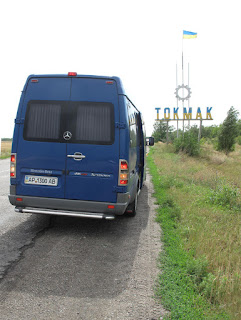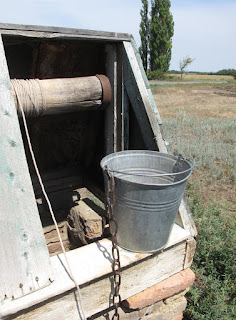(Click on this map to enlarge)
My cousin-in-law Nancy's ancestors came from Rudnerweide so that was our first destination. We headed to the village of Tokmak and traveled southeast from there. Tokmak was the market place where Grandpa and his sister Liese took goods to sell during the famine just before emigrating to Canada. Here is a 1922 image I found of vendors at the market in Tokmak:
Even though there was not much that remained of the former Mennonite village of Rudnerweide, we experienced amazing insights into typical rural Ukrainian life. As our driver was turning around in a driveway, the lady of the house came out to greet us and, after a few words of greeting and explanation, she was more than happy to show us her home and its connection with the Mennonite past.
Svetlana introduced herself to us along with her daughter and grandson who live with her. As Svetlana explained, even though her home had been renovated and was not the original Mennonite structure, the root cellar (originally built by the Mennonites) remained intact and is still in use today. She even let us go down to check it out! It remains the perfect place to store a winter supply of pickled and canned produce, much like we would find in our Grandparent's basement in their home in Canada.
Her yard was full of trees, including walnut, mulberry, apricot and other fruit trees. We had to remember that services are not as available in rural Ukraine as they are in rural Canada. Drinking water, for instance, is trucked in every six weeks while rain water is collected in a container and water is lifted from one of two wells for non-drinking purposes.
The original well, built by Mennonites over 100 years ago, still stands next to the house. Since the water from this well is deemed salty, it is used as a last resort if other sources of water on the property should dry up.
When the Revolution came to the Ukraine, self-appointed authorities redistributed the land among those of low economic status; anyone with a profession (such as teachers) were automatically seen as economically wealthy and overlooked in the process.
Through our translator Ludmilla, we learned that Svetlana is one of those victims of this 'fair system' for she continues to make a minimum wage as a teacher and does not have any title to property, including the home and land where she lives!
This will no doubt prove to be a problem now with the fall of communism and Ukraine about to allow people to again sell property in a couple years. Chances are, the owner (the one with documents) will show up and evict Svetlana and her family. It will not matter how hard she has worked the land to make it productive or how she has responsibly taken care of this property for decades. With next to no income and savings, Svetlana and family will be forced to find a new home. Yet, despite the uncertainty, Svetlana had such a positive and calming disposition when talking with us. She is resigned to deal with the situation when it comes.
We could have visited with Svetlana for hours more but we needed to move to the other villages before sunset! From Rudnerweide, we drove along a main road that connects the southern communities, eventually arriving at a region called Orlovo that includes the combined villages of Rosenort, Blumenort, Tiege and Ohrloff.
Most of us were particularly interested in these villages because relatives on my father's side lived here. In fact, when I heard the village name of Blumenort, my thoughts immediately went to a writing by my Grandmother's sister Anna. One small paragraph in her account describes how villagers felt when they witnessed the bandits hunting people down and torching their town:
"We decided we would seek our safety on freshly ploughed land, where no one would suspect us. We would simply lie down in the deepest part of the furrow... from where we had an unobstructed view of Blumenort, which was now in flames. In fact, from our vantage point, the whole town seemed to be one huge, crackling fire... in that terrible October night in 1919. What had taken over a hundred years to build was destroyed in the course of one night. Long planning, hard labor, capital, dedication and pride – all these had been the brick of a structure, a community, that had made civilized life possible. Now the structure lay in ruins and, to be sure, rebuilding it would require that the same bricks be reassembled again. The prayers I said that night did not have a very calming effect on me, for they all seemed to end in the same question: why did God allow such terrible things to happen? But then I remembered a recent exhortation from our minister: that God’s ways are not our ways, and that His design should not be questioned." (Dyck, In Memory of my Ancestors of Unruh and Thiessen, p. 24-25)It was surreal to stand on the main street of Ohrloff, knowing that my Dad's family had lived there for decades. Having a map of Ohrloff from 1919, we did our best to find the location of my Grandparent's yard. Once we determined the area, we once again encountered a lady of the home who was obviously curious why we were there. How wonderful that she allowed us to explore her yard, the very yard we believe belonged to my Grandparents.
John, Louise, Ohrloff Lady, Jamie, Jonathan, Becky, Nancy (in back) & David
I'm not sure whether the house or barn are the same but stories immediately flooded back to when my Grandfather hid in the barn when the bandits came looking to kill him. As my Aunt Mary recounted to me when I was a boy, my Grandfather hid in the hay stack in the barn only to be missed by the pitch fork that was thrust through by the bandits. If my Grandfather had not survived this search, I would not have known him decades later, after they emigrated to Canada and settled in a home in the city of Kitchener.
As we headed back to the ship waiting for us on the Dnieper River, we stopped at the train station in Lichtenau. This is the station where so many Mennonites in the area were allowed to leave the Ukraine to settle in an unknown land half the world away. Today we have the internet where we can find out practically anything we want to know about places all around the world, but those in the early 20th century simply did not know where they would end up. All they knew is that they were leaving what was familiar to them, hoping for a better life on the other end of the journey.
My Great-Aunt Margarite expresses the feelings so many of them must have had on the day of departure:
"Finally the signal came and people began climbing into the boxcars. Those who remained on the platform -- and there were many of them -- were obviously staying on and had come to the station merely to see off relatives and friends. They would now go back to the horses and wagons, return to their towns and villages and resume the familiar routine of their lives. Oh, what bliss to have a home to go to, to know its comforts and peace, a home where children's laughter echoes through halls, a safe refuge from which to view and contemplate the world! All these thoughts raced through my brain now that I suddenly realized I didn't have a home.
As I stood inside the boxcar and looked through the open door, feasting my eyes on a world I knew well, everything I saw suddenly became very dear to me -- the station, the horses and the wagons, and the multitude of people waving handkerchiefs -- all these now became my home, something that was part of me and yet from which I would be torn. The whole idea of emigration suddenly struck me as quite repulsive. To leave familiar environment for something unknown was surely insane. Who really knew the value or the worth of having a home? ...But all these words, confessions and emotions became clogged in my throat and the only energy I could muster was to raise my arms in symbolic embrace, while the love I had wanted to express melted into tears, blurring my vision...
The train started to move. For a few minutes I felt completely immobile, with my eyes riveted on what remained my 'home'. Then, as the waving handkerchiefs receded into the distance, I remember thinking that I had just lived through one of those moments when one of the threads of life had broken, never to be spliced again. For a while the train rolled past towns and rural scenes familiar to me, but soon the areas I had known gave way to hills and forested regions, which was but a reminder that my 'home' now lay far behind me." (Unruh, We Are Leaving Our Home, p. 34)






